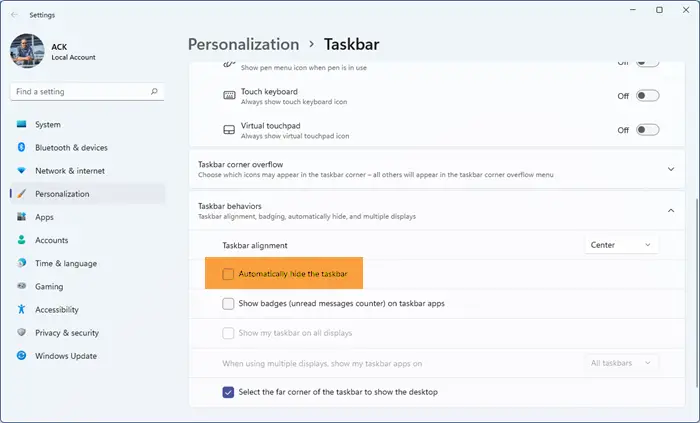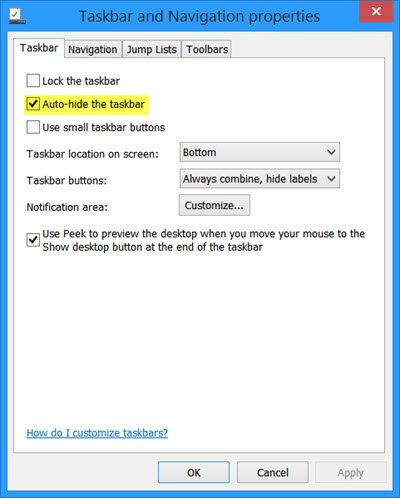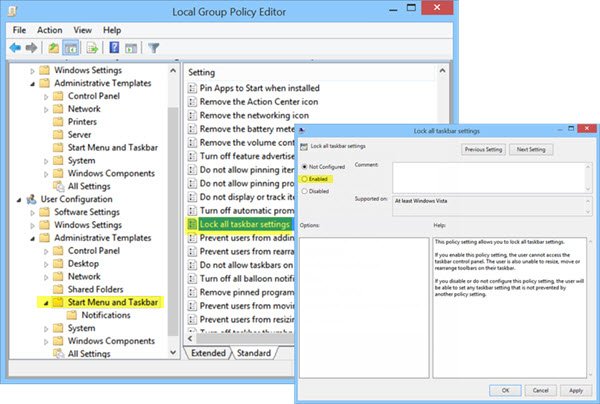If you don’t like the Taskbar to appear on your Windows 11/10/8/7 desktop all the time, you can easily set Windows to auto hide the Taskbar when not in use. You may need to hide the taskbar because you need more space on your desktop, or maybe you feel that it just gets in the way and you want it to appear only when you need it, or maybe you use a third-party dock or a launcher. In any case, you can set the taskbar to hide automatically, if you wish.
Auto Hide Taskbar in Windows 11

To auto-hide theTaskbar on Windows 11:
- Right-click on the taskbar and select Taskbar settings
- Scroll down till you see Taskbar behavior
- Expand Taskbar behavior section
- Select Automatically hide the Taskbar
- The taskbar recedes and hides automatically when not in use.
To make it appear, when you want it to, you then have to move your cursor to the bottom of the screen or the taskbar area – or you could press Win+T.
Auto Hide Taskbar in Windows 10

To auto hide Taskbar on Windows 10:
- Right-click on the taskbar and unlock the taskbar
- Again right-click and select Taskbar Properties
- Under Taskbar tab, check the Auto-hide the taskbar setting.
- Click Apply > OK.
You will now see that the taskbar recedes and hides automatically when not in use. To make it appear, when you want it to, you then have to move your cursor to the bottom of the screen or the taskbar area – or you could press Win+T.
Auto Hide Taskbar using Group Policy in Windows 11/10
To disable the Auto Hide the Taskbar setting via Group Policy, Run gpedit.msc to open Group Policy Editor and navigate to the following setting:
User Configuration > Administrative Templates > Start Menu and Task Bar

In the left pane, double-click Lock all taskbar settings and Enable it. This will prevent users from making any changes to the Taskbar.
This policy setting allows you to lock all taskbar settings. If you enable this policy setting, the user cannot access the taskbar control panel. The user is also unable to resize, move or rearrange toolbars on their taskbar. If you disable or do not configure this policy setting, the user will be able to set any taskbar setting that is not prevented by another policy setting.
Auto Hide Taskbar registry key in Windows 11/10
For those who may be interested, the concerned registry key that deals with this setting is:
HKEY_CURRENT_USER\Software\Microsoft\Windows\CurrentVersion\Explorer\StuckRects2
Auto hide taskbar is not working, and Taskbar won’t hide
There may be times; you may notice that the auto-hide taskbar is not working and the taskbar won’t hide. If a taskbar button flashes or something which needs your comes up in the taskbar notification area, the taskbar won’t let auto-hide till you address that issue. It could also be some software that may be programmatically making the taskbar visible.
See if any 3rd-party software is preventing this. If so, disable this icon from appearing on the taskbar. Disable showing of notifications for such problematic taskbar icons. In Windows 10, you will be able to do this via Settings > System > Notifications & actions.
In most cases this problem is temporary, and a restart usually makes the problem go away. Also, Auto-hiding of the taskbar is not supported on Windows Tablet PCs where only touch or pen screen input is being utilized with no keyboard or mouse.
How to Hide Taskbar with a Hotkey in Windows 11/10?
The Auto-hide taskbar feature will hide the taskbar and the start button. If you want to hide only the taskbar, and not the Start Button, use our freeware Hide Taskbar. It lets you hide or show the taskbar with a hotkey.
TIP: How to Auto Hide Desktop Icons may also interest you.